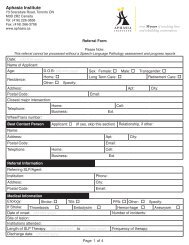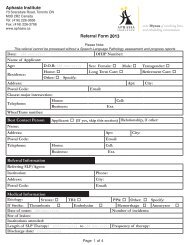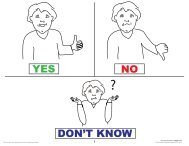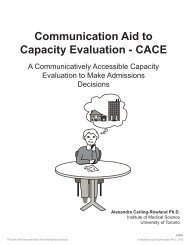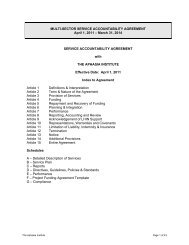SLP Survey Report_Final - Aphasia Institute
SLP Survey Report_Final - Aphasia Institute
SLP Survey Report_Final - Aphasia Institute
You also want an ePaper? Increase the reach of your titles
YUMPU automatically turns print PDFs into web optimized ePapers that Google loves.
Interventions:<br />
• For patients with dementia, participants indicated that the interventions in their program:<br />
very frequently include deficit specific semantic therapy; frequently include deficit<br />
specific phonological therapy; occasionally include syntax training; frequently include<br />
treatment of reading and writing; frequently include other language specific therapy; are<br />
less likely to include constraint induced aphasia therapy; very frequently include<br />
functional communication activities of daily living; very frequently include multimodality<br />
or total communication training; occasionally include participation oriented<br />
intervention; and very frequently include counseling.<br />
• For family members of people with aphasia, participants indicated that the interventions<br />
in their program very frequently include caregiver education and communication partner<br />
training and frequently include emotional support;<br />
• Participants indicated very frequently doing education about the term aphasia with<br />
persons with aphasia, family of persons with aphasia, and other health care providers;<br />
occasionally using education about the term aphasia with friends of persons with aphasia<br />
and community members/groups;<br />
• Participants indicated very frequently doing education about the causes of aphasia with<br />
persons with aphasia and family of person with aphasia; occasionally using education<br />
about the causes of aphasia with friends of persons with aphasia and other health care<br />
providers; and rarely using education about the causes of aphasia with community<br />
members/group;<br />
• Participants indicated very frequently doing education about recovery in aphasia with<br />
persons with aphasia and family of person with aphasia; occasionally doing education<br />
about recovery in aphasia with friends of persons with aphasia and other health care<br />
providers; and rarely doing education about recovery in aphasia with community<br />
members/groups<br />
Enablers and barriers:<br />
• The most common enabler and barrier to accessing evidence was conference attendance<br />
and the availability of evidence-based summaries that include practice strategies<br />
respectively;<br />
• The most common enabler and barrier to accessing support and resources related to<br />
aphasia was the availability of communication tools and availability of community-based<br />
aphasia services respectively;<br />
• The most common enabler and barrier to team processes was functional communication<br />
intervention strategies and workload respectively;<br />
• The most common enabler and barrier to evidence-based education was online<br />
opportunities (e.g., courses, e-Learning, webinars, CoPs) and training in aphasia<br />
communication techniques for community-based care respectively;<br />
• Participants did not have opinions on whether the following are enablers or barriers to<br />
accessing evidence: usefulness of Canadian Stroke BPG, availability of BPG specifically<br />
for aphasia, availability of Canadian Stroke BPG, physician support of BPG, and<br />
information about how other organizations implement BPG.<br />
Overall, it is anticipated that the results of the survey will be used to help inform the team's<br />
recommendations, as well as future grant proposals.<br />
<br />
5



